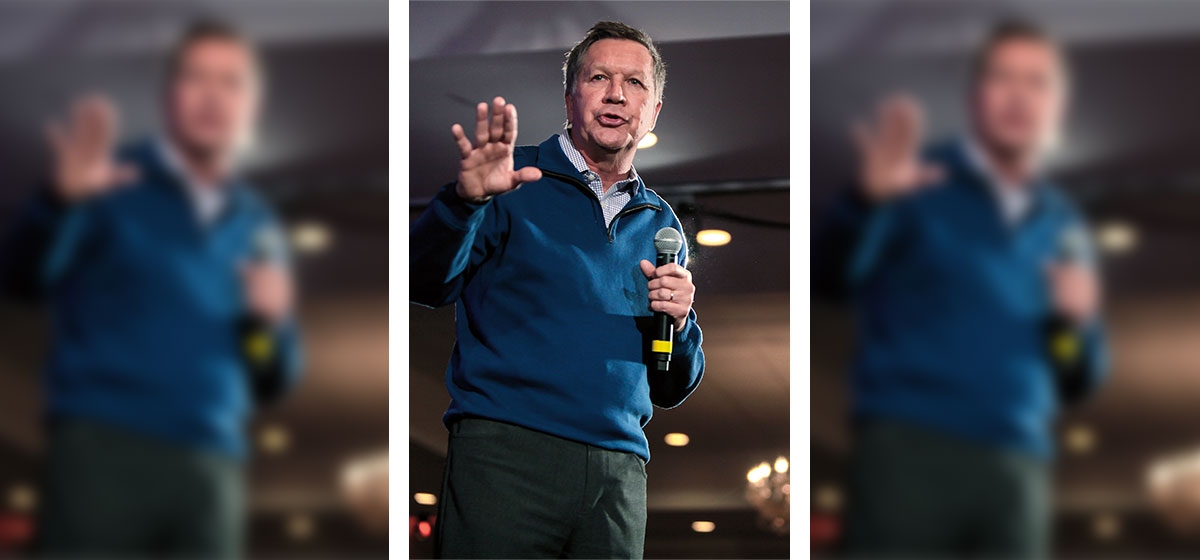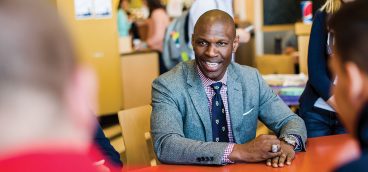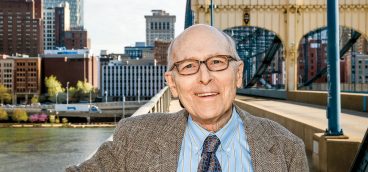John Kasich, Government Leader

I was born and raised in Mckees Rocks, Pennsylvania, not far from Pittsburgh. It was a working-class, blue-collar town, but it was a positive place. I loved it there.
As a kid, I played a lot of sports, and learned a great deal from that, about working together and trying hard. I was also blessed with many friends. Families back then were strong and stuck together. So did neighbors.
Our education was basic, but good. The people in our town didn’t have much money and, given our limited resources, in almost all things, we got what we got, and that was it. But it was “home.” It’s where I come from. Even today, years later, the people I knew there are still in my mind’s eye.
In those days, which would have been the 1950s and ’60s, life in McKees Rocks was fairly normal. We were pretty much shielded from the trouble and upheavals that seemed to be taking place all around us. Like so many kids back then, I had a paper route. A buddy and I also had a grass-cutting business. But things started to change by the time I reached high school. People began moving away as our industrial base slid into the steep decline that would, in time, devastate the region.
My dad was a mailman and carried mail on his back to homes all around McKees Rocks. He worked in the post office there. My mother, depending on what was going on with us kids—me, my brother and sister—worked in the post office downtown. This was before computers, so she had to hand-sort letters and parcels by ZIP code. In any case, life was comfortable enough for us Kasiches.
Many families in McKees Rocks, and mine was no exception, professed a strong, Christian faith. But that’s not something that came from our roots. I believe that it came directly from God. Most of the people I knew went to church. I went, too, and was very active there. At times, I felt inspired by it all. But, like most kids, I drifted away during my college years, and then for years thereafter, but finally headed back after both of my parents were killed in a car accident, hit by a drunk driver. The death of my parents was profound and terrible, and it’s difficult when you suffer such a sudden and tragic loss. It’s easy to become permanently scarred or bitter in the aftermath. But I worked my way through it, mainly because of my faith, and the people around me who ministered and tended to me. And I have to say, I think I actually came out a better man as the result of it.
When I was a teenager, my mother worked with a lady whose son had gone to Ohio State University and raved about it. So, during my senior year of high school, my dad and I drove out to Columbus to tour the campus. The minute I got there, I thought it was great. So, at 18, I left home, headed to OSU, and never looked back. Nobody there knew me. It was like starting my life all over again, which was very freeing. Choosing Ohio State was a pivotal decision for me when it came to determining the things that I could ultimately do with my life. Even then, I wanted to serve the public, have a positive effect on my community and, who knows? Maybe I’d go even beyond that.
I love the state of Ohio, truly. It has been my home now for about 50 years. It’s where I matured and came into my own. But compared to McKees Rocks or Pittsburgh, its culture was very different. Columbus and central Ohio, in those days, were less ethnic than I’d been accustomed to, which required a little adjustment from me. It wasn’t quite the “melting pot” where I was raised, and moderate way of speaking with Ohioans, although some might say I didn’t adjust all the way.
I’m part Czech and part Croatian, but my family didn’t do the traditional ethnic things that other families did in McKees Rocks. Some people chose to celebrate their ethnicity, and that was great, but my mother didn’t think about that too much. My family was about “America.” My father’s parents were very poor. His father was a coal miner. And my mother’s mother could barely speak English. On my mother’s side, there was also a lot of poverty. My ancestors were too busy scraping out a living to worry about tracing their family roots. Frankly, to this day, we don’t really know for sure exactly where my father’s father came from. No one really talked about it.
In my opinion, I don’t think we, in America, give enough credit to our upbringing. But it is so important to our lives as they unfold. No matter where you go, people will tell you that their grandparents, mothers and fathers, aunts and uncles, and even neighbors, had a profound influence on them. I believe that, if you study someone’s upbringing and understand the power exerted by their family members and others early in their life, you will know who that person is.
My mother was opinionated and intelligent, but under-educated because her family didn’t have the money to extend her schooling. But she’d have been a great lawyer, if given the chance. My father had a great personality. He was smart and warm, the kind of a guy who really liked people. So, the personalities of my parents merged to create my own. From my mother, I got my independent, opinionated nature, and my ability to shake hands and mix it up socially came from my father. But there was one thing they had in common. Both of them always told me, “Just go and do it.”
I guess those words were on my mind when, in my freshman year of college, I decided to write a letter to then-President Richard Nixon. It was a pretty positive letter about his presidency, but it was written about 50 years ago, before Watergate and all the rest. In any case, that letter found its way to Mr. Nixon and, as a result, I was invited to the White House to meet him. I think that he, at the time, wanted to get a sense of what was happening on college campuses. I don’t have any idea why my letter, in particular, caught his eye. Maybe it was just something that was meant to happen.
Now, I don’t want to overstate this, but sometimes I think that we’re all destined to do certain things, even though, unfortunately, we don’t always manage to do them. It isn’t always easy to fulfill your destiny. But I think we all have opportunities to do so. The question is, will we take advantage of them? In other words, God didn’t say to me, “John, someday I’m going to schedule you a meeting with the President of the United States,” but he did give me the gumption to be able to speak out and ask for something for which most others wouldn’t think of asking. Now, that doesn’t make me better than anyone else. It’s just the way I am. I took to politics because of my mother’s interest in public affairs, talk radio, and so on, and found that I had an interest in it, too—so much so that I majored in political science at Ohio State. Public service sort of came naturally for me.
When I was first elected to the State Senate of Ohio, it felt strange because, for a number of years after college, I had a job on the Senate staff and worked with many of the members. Then, suddenly, I was their equal, which was probably harder for them than it was for me. I was an independent guy, and for that they would get mad at me from time to time. I was probably a little bolder than I should have been at the outset but, hey, I was just a kid. Recently, I talked to a man with whom I was in the state legislature who’s now in his 90s and thought, “My God, I really was much younger than those folks.” In fact, I was one of youngest people ever elected to the State Senate. But I always did my homework, which was really important. The other senators could argue with me, or try to put me down for being naive, but they couldn’t “out fact” me. Things were really bipartisan back then. I had Democrat friends with whom I worked on legislation, and it was a great time to have that job. Before long, I ended up being elected to the U.S. House of Representatives, at just 30 years old. On the night I won my congressional seat, I thought, “Now I’ll get to go down and work with Presidents.” And that’s exactly what happened. I was there for 18 years and did a lot of good, including helping to balance the federal budget for the first time in 40 years.
In 2011, I was elected Governor of Ohio, which was exciting—and unusual. For almost 10 years before that, I was in the private sector, working in business and only helping out in politics. When I decided to run, I wasn’t holding any public office, and no one in Ohio’s state history had ever done that before. But again, it just seemed natural for me. It was the thing to do. I had enormous confidence that I could do the job. I got off to a flying start, and it has worked out well, I believe. Ohio is really in better shape now than it has been in many, many years. We’re up about 550,000 jobs, and we’ve put Ohio back on solid financial footing with $2.7 billion in budget reserves. I’m very proud of the fact that our state has the most improved business climate in the nation.
As a Republican and a conservative, I truly think we need a government just large enough to get things done efficiently and meet the needs of the people. When you’re in power, you must try to do good things, and you must be bold because you don’t know how long you’re going to be in office. You should strive to make a difference, but be sure to keep everybody, from the top to the bottom, in mind when you act. You must look at issues closely and have good people around who can help guide you, whose judgment you trust. You put a team together and you do something. When it comes to my positions on various issues, I have the willingness and capacity to listen and change, if that’s what needs to be done. But much of the time, you must follow your gut instincts.
The state of our country today is chaotic. We’re so divided, in a way unlike anything I’ve ever seen or known in my lifetime. Sure, there were riots and campus disruptions in the 1960s, but those were different. They involved important issues like the Vietnam War and civil rights. There was something substantial behind those protests. Now, it’s just divisiveness. It’s all about, “You have it, I don’t, and I’m bitter about it.” I can remember my family telling me about the Great Depression and how people came together and shared what they had for the betterment of all. As hard as those times were, people “knew no strangers.” Today, people on the extremes are taking guns and clubs to protest meetings. It’s not healthy, and it’s not anything that I’m used to. Will we come out of it? I hope so.
Over time, I think people will begin to sort out what they believe is true and what they believe isn’t. Right now, they’re being bombarded with information and really don’t know what to think. A lot of people say they don’t watch the news anymore because it’s too depressing, or because they can’t figure out what’s fact and what’s fiction. Sooner or later, people will choose what they want to tune in, and what they want to tune out. I have faith in people’s judgment. We are in a polarized time right now, yet we will find our way back to the middle. But it’s been stressful. I find myself reading things online and thinking, “That stirs me up, but is it real?” And I sometimes think, “Well, maybe I’m just reading more than most people.” But we are certainly a divided country. And we’re in desperate need of people with calm voices who say, “It doesn’t have to be this way.”
Running for president in 2016 was great. It was hard work, but fun, and we did extremely well, considering where we started. I was the last guy standing at the end, which was pretty amazing, and I have nothing but positive things to say about the experience, even though it was unlike any presidential election I’d ever seen. At the time, I was at odds with almost everyone who was running on many, many issues. Now, as I go around the country, people say, “Well, at least you stood up for me in the debate.” Do I believe that? Yeah, I think so. It means that I held my head high through the whole process and people noticed it. Because I did that, many people have a lot of good things to say. In fact, many tell me today that they were pulling for me but, if that was true, I would be president! It’s easy for people to say that now. But I’m thrilled that I did it. We operated with a very limited budget, and we offered a positive message. There were frustrations, but I don’t think too much about that. I think about how remarkable it all was.
One thing that does get me down sometimes is Congress. It’s not getting anything important done for the people. All government, right now, is pretty well dysfunctional, no matter where you go; whether it’s in Washington, in the states, or in communities. I keep looking to see what the Democrats are offering. They seem to be promoting very “left-leaning” ideas that are not going to work. My father was a Democrat, but he wouldn’t have said “We should have open borders,” or “We should have Medicare for all,” which would eventually bankrupt the country. The Democrats seem to want to elect socialists, but that’s not going to get us anywhere. What both parties are missing are those in the middle. And when I say “middle,” I don’t mean “moderate,” or “weak.” I mean people who have common sense, who seek the truth, and want to play and live by the rules. We don’t see much of that now. The people who supported Donald Trump had legitimate complaints, God bless them, but we’re not going to get out of this mess we’re in by being victims, or playing the “blame game.” Everybody must work together in their communities to make sure that no one gets left behind, which is what we’ve done here in Ohio. That’s why the state is strong today.
What’s great about being a governor is that you have the ability to formulate strong policy. And you can execute it if you have some willing partners in the legislature, which I’ve had, by and large, through almost all of my two terms. I like to think of myself as the guy who can “bridge the gap.” Sure, we have a Republican-dominated legislature and I’ve had some good leaders here who helped me get some things done quickly early on, because we were in a real crisis. We had a window of opportunity and pushed through a lot of necessary things.
The hours required by my job are not as bad as you might think. It leaves me time to spend with my wife, Karen, and our two daughters. As a governor, I’ve found that, once you know what you want to do, you just put things in place and go. You don’t have to kill yourself. You don’t need to be Jimmy Carter, reading every line of every bill. That’s what your team is for. But you need to know how to manage, like Ronald Reagan did. You also need to know how to hire or to employ people who know how to hire. You set the “guiding star,” and have people around who can argue with you, or correct you, but, ultimately, when a decision is made, support you. But I’ll be leaving my job in January and don’t know what I’m going to do next, exactly. But it’s going to be a time of exciting change. What will my next challenge or adventure be? Will I run for President again? People always ask me that. If I decide to do it, I’ll let you know. But until then, I have nothing to say about it.
I must admit, even at the age of 66, I still think about the heroes of my youth. Once, I went to a Pittsburgh Penguins hockey game and they announced that Bill Mazeroski was in attendance. Suddenly, I was a kid again. I remember when he hit the famous home run to win the World Series in 1960. So, I went from suite to suite inside the arena to find him, and did. I think he needed to have his shirt dry-cleaned the next day because I slobbered all over him talking about how great he was.
I still follow the Pirates, although I’m disappointed because I’m not convinced that their ownership is trying to bring a title back to Pittsburgh. I hear that they’re fine people, but I’m not seeing results. And I still like the Steelers. I attended a baseball game in Pittsburgh not too long ago, but haven’t been to a football game there in what seems like a hundred years. I still like the food, and like to go back every so often to visit friends from the old neighborhood, though there aren’t too many left these days. I have a brother who lives in Pittsburgh and a sister who lives and works in West Virginia. Many times, my out-of-state family members come to Ohio because of events we have, whether it’s graduations for my girls, or gubernatorial stuff. I’m an “Ohioan” after all, you know?
What I remember best about Pittsburgh, besides the Horne’s, Kaufmann’s and Gimbels department stores, was a Woolworth’s that was located downtown in Market Square. My mother would take me there sometimes and I can still see the balloons set up behind the counter. You’d pick one out and pop it, and whatever price was inside, that’s what you paid for your banana split. Sometimes you could get it for a penny! It was just great.
I have a lot of good memories of growing up in McKees Rocks. I had neighbors—my good buddies—whose father worked in radio. They had a short-wave set and we would listen to music on far-away stations. Sometimes, we would go to Buhl Planetarium and look up at the stars. At other times, we’d read books together and dream. It was a good life. So, in combination with sports, which we played day and night, we had music, astronomy, literature —and, of course, religion. Exposure to these things helped to make us who and what we were: “Renaissance kids.”





